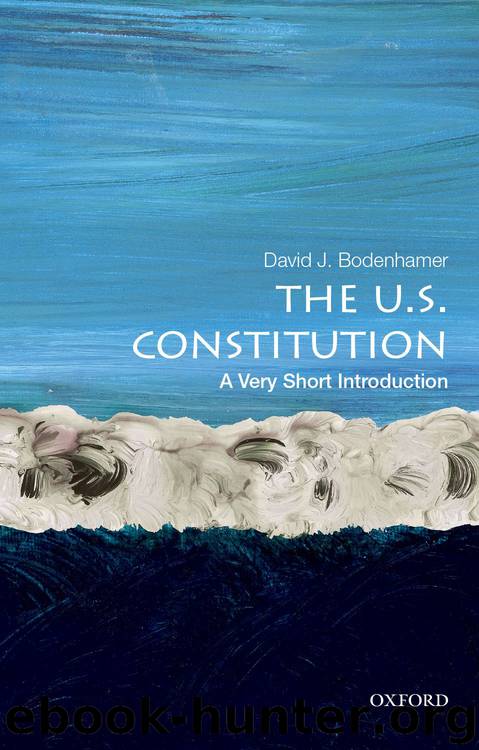The U.S. Constitution by David J. Bodenhamer

Author:David J. Bodenhamer
Language: eng
Format: epub
ISBN: 9780190865672
Publisher: Oxford University Press
Published: 2018-01-17T00:00:00+00:00
Dorr’s Rebellion was a harbinger of class-based efforts in the late nineteenth century to restrict the vote as waves of eastern and southern Europeans, Jews, and Asians flooded the nation’s cities. But it was an outlier during the pre–Civil War decades. Democracy, with its emphasis on popular consent, was the new American gospel. It roiled the nation with its promise of individual equality in a more perfect union: “The country is full of rebellion; the country is full of kings,” essayist Ralph Waldo Emerson observed in the mid-1840s. Participation in the nation’s affairs did not apply to women, blacks, and certain categories of white men, most often paupers, migrants, and felons, but few people doubted that the United States had birthed a new democratic age.
The Civil War and Reconstruction embedded representative democracy as the mode of constitutional government in the United States. Modern warfare has a leveling influence—the battlefield does not honor class distinctions—and the emphasis on equality and democracy as core constitutional values stemmed in part from its effects. The Reconstruction amendments made this clear by advancing a new, inclusive definition of citizenship depending solely on place of birth (or naturalization). They also pledged national power to ensure equal protection of law for all citizens and introduced a new equation that linked liberty, equality, and democracy. Freedom for all people (Thirteenth), unconditional equality before the law for all citizens (Fourteenth), and guaranteed access to the ballot box (Fifteenth) provided the constitutional frame for this turn.
From Reconstruction to 1920, two stories of democratic constitutionalism emerged. One was its formal expansion to excluded groups, as expressed through the right to vote; the more disturbing story was restriction of the right in law and practice. In 1876, the Supreme Court held that the Fifteenth Amendment did not confer the right to vote but only prohibited exclusion on racial grounds; it also eviscerated key provisions of the law passed to enforce the amendment. Throughout the South blacks effectively lost the right to vote by literacy tests, grandfather clauses, poll taxes, and intimidation because it was easy to deny the vote by legitimate means. As one black Georgia voter poignantly testified before a Senate committee, “You may vote till your eyes drop out … [but] there’s a hole in the bottom of the boxes some way and lets out our vote.”
A desire to limit voting by class also was common, as witnessed by an Alabama leader’s promise to keep “ignorant, incompetent, and vicious” white men from the polling booth. The effort worked. In Mississippi, for instance, turnout plummeted from 70 percent in the 1870s to 15 percent in the early twentieth century, a level that suggests how severely the new restrictions curbed not only black but also poor white voting.
The issue in the North centered on the 25 million new immigrants who flooded its cities from 1870 to 1920. Most arrivals were poor laborers—“dangerous classes”—from southern and eastern Europe who supported big-city political machines. Middle-class reformers sought to lessen their electoral influence by repudiating the notion that voting was a right and pushing for restrictions to purify the electorate.
Download
This site does not store any files on its server. We only index and link to content provided by other sites. Please contact the content providers to delete copyright contents if any and email us, we'll remove relevant links or contents immediately.
The Secret History by Donna Tartt(19097)
The Social Justice Warrior Handbook by Lisa De Pasquale(12193)
Thirteen Reasons Why by Jay Asher(8915)
This Is How You Lose Her by Junot Diaz(6891)
Weapons of Math Destruction by Cathy O'Neil(6283)
Zero to One by Peter Thiel(5805)
Beartown by Fredrik Backman(5763)
The Myth of the Strong Leader by Archie Brown(5511)
The Fire Next Time by James Baldwin(5452)
How Democracies Die by Steven Levitsky & Daniel Ziblatt(5221)
Promise Me, Dad by Joe Biden(5155)
Stone's Rules by Roger Stone(5089)
A Higher Loyalty: Truth, Lies, and Leadership by James Comey(4965)
100 Deadly Skills by Clint Emerson(4929)
Rise and Kill First by Ronen Bergman(4792)
Secrecy World by Jake Bernstein(4755)
The David Icke Guide to the Global Conspiracy (and how to end it) by David Icke(4721)
The Farm by Tom Rob Smith(4516)
The Doomsday Machine by Daniel Ellsberg(4492)
